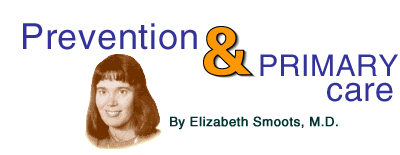
Talking to Your Teen About STDs
Two recent articles in my local newspaper, the Seattle Times, announced the good news: Teenagers are more likely to abstain from sex today than at any other time in the past 10 years. "Fewer teens are having sex and those who do are more likely to use condoms," notes one of the articles, describing on a survey of high school kids conducted by the Centers for Disease Control and Prevention. The survey found that sexual activity among teens decreased from 54.1 percent in 1991 to 49.9 percent in 1999, and that condom use increased from 46.2 percent in 199l to 58 percent in 1999. These changes occurred as health officials urged the public to practice safer sex to avoid contracting HIV, the virus that causes AIDS.
As a family physician who treats teens, and as mother of a soon-to-be preteen, I am glad to hear this news. If you are the parent or guardian of a teen, you too may be concerned about your child engaging in sexual activity. Each year an estimated 15 million Americans, including nearly 4 million teenagers, are infected with a sexually transmitted disease (STD). Typically, about one-third of the chlamydia and gonorrhea cases in this country are contracted by teens.
Left untreated, STDs can cause serious problems, potentially jeopardizing teens' future health and even their ability to have children. Acute symptoms may consist of burning upon urination, discharge, genital sores, and pelvic or abdominal pain. Many STDs, though, manifest without noticeable symptoms and thus may go unnoticed until they are in the advanced stages. The toll of an untreated STD can include pelvic infection, infertility, ectopic pregnancy, birth defects, and occasionally cancer, heart disease, blindness, or even death.
Communicating with your teen
The key to prevention is good communication with your teenager. When I'm talking to teens in a sex education class setting or in my office, I emphasize that abstinence is the only completely effective way to protect against sexually transmitted diseases. And while it's essential to discuss abstinence, it's also vital for your teen to be knowledgeable about STD prevention in case he or she becomes -- or is already -- sexually active. This includes using condoms and having a monogamous relationship with an uninfected person.
Several risk factors may place your teen at increased risk for acquiring a sexually transmitted disease. These factors include starting sexual intercourse at an early age, having multiple sex partners, and using alcohol or drugs. However, as long as teens are susceptible to peer pressure, they are all at risk. Here are the American Medical Association's recommendations for medical care to prevent STDs during the teenage years:
All young people ages 11-21 should have an annual preventive care visit with their health care provider. Part of this time is typically spent on questions and answers about sexual activity.
Screening for sexually transmitted diseases is recommended for all teenagers who are sexually active.
Confidential HIV (AIDS) testing should also be offered to all who are sexually active. (Specific risk factors for HIV include being infected with any other STD; having multiple sexual partners; having unprotected anal, oral, or vaginal sex with an infected person; using intravenous drugs; or receiving blood products between 1978 and 1986.)
Sexually active teenage girls should have an annual Pap smear to screen for cervical cancer, a malignancy that can be caused by human papilloma virus (HPV).
Elizabeth Smoots, M.D., F.A.A.F.P., is a board-certified family physician in Seattle, Washington. A fellow of the American Academy of Family Physicians, Dr. Smoots writes about prevention and primary care medicine.
Related links:
Outside link: Information on STDs from the Journal of the American Medical Association
Outside link: Basic information about HIV/AIDS from the American Medical Association

